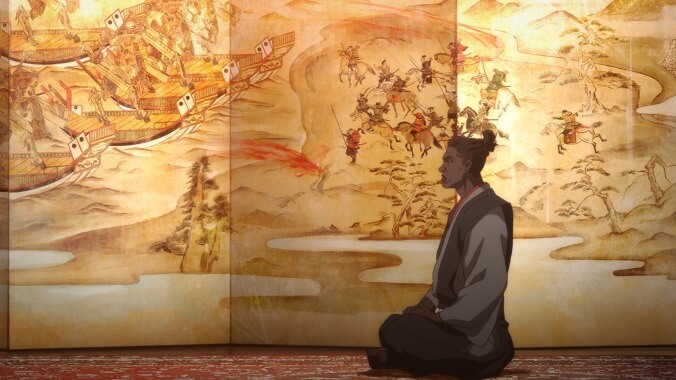The story of a real-life Black samurai isn’t enough for Netflix’s Yasuke

In the 1570s, a 6-foot-tall Black man referred to as Yasuke arrived in Japan, quickly drawing the attention of legendary leader Oda Nobunaga. The two became friends, and as the story goes—actual historical records about Yasuke are hard to come by—Yasuke somehow rose to the rank of samurai within a year, and became a loyal warrior at Nobunaga’s side. Just a few years later, Nobunaga was forced to kill himself after being betrayed by one of his generals, and though Yasuke was supposedly there at the time, there’s no real account of what happened to him afterward.
As far as anyone knows, that’s all true. LeSean Thomas’ new Netflix anime Yasuke isn’t really interested in telling that story, though. Instead, it uses that backstory as a jumping-off point, opening with Nobunaga’s death, but Yasuke is so far removed from reality that its connection to a real guy is detrimental to the story it’s trying to tell.
In the fantastical world of Yasuke, a Black samurai is totally bizarre and unheard of (people are surprised every time they see him), but nobody questions the many wizards, monsters, demons, giant mecha suits, and full-on robots running through the forests of Japan. It’s jarring when the first sci-fi/fantasy elements show up and go completely unaddressed, and it continues to be as the sci-fi/fantasy stuff ramps up without ever reaching a point where it really makes sense. What makes it especially weird is the fact that Yasuke otherwise offers what looks like a realistic recreation of this era of Japanese history, from the architecture to the outfits people wear, meaning the fantastical stuff like magic and robots didn’t translate to similar advances in, say, electricity or transportation.
It sticks out more than it would in a subtler magical-realist story, but it is worth noting that one read on Yasuke could be that it’s supposed to be disconcerting when overtly unrealistic things are easily acceptable while the basic concept of a Black man being a samurai is not. Yasuke is relatively new to Japan, though the details of his personal history and how much time has passed since he arrived in the country are fuzzy (he met Nobunaga through foreign merchants and came on a ship, but that’s really all we get), so the fact that he’s treated as being unusual while openly ridiculous stuff is not is an interesting illustration of what he’s going through.
The show doesn’t necessarily earn that—for one thing, there’s a team of mercenaries who are mostly from different countries and are all various sci-fi/fantasy archetypes, and they all also treat Yasuke as if he’s the aberration. Really, the regular people of Japan who the protagonist interacts with on a day-to-day basis don’t question who he is or why he’s there that much, but a Russian woman who transforms into a bear monster and works for an evil Christian missionary is totally thrown off by Yasuke’s presence.
It’s tempting to try and look for something else going on in Yasuke, because everything else about it feels somewhat slight. The action scenes are fun to watch—because how could they not be when they involve a samurai and robots and magic—but there are diminishing returns when every fight has a bigger robot or a more foreboding monster. No matter how many previously hidden powers the demonic villain ultimately wields, Yasuke is always going to pull from an ever-deeper well of unique inner strength that allows him to overcome any situation. The stakes are never all that real, which makes everything feel hollow after a while.
The animation doesn’t really help with that, since it all kind of fits into the house style of Netflix-produced anime (Castlevania probably being the most famous example), but it at least doesn’t look cheap or uninspired. Yasuke himself cuts an imposing figure, and there is some fun in watching him tower over his young ward (a magical little girl who needs his protection) and then watching enemy samurai or mechs tower over him. The show, like a lot of modern anime, also unfortunately adheres to the trend of CG stuff mixed in with 2D characters, which rarely ever looks seamless (let alone good). It’s not egregious, but the two techniques look incongruous whenever a CG robot stiffly lumbers around alongside otherwise smoothly animated characters.
LaKeith Stanfield is good in the title role, even if he doesn’t get to do a whole lot—Yasuke is either in a solemn funk and feeling depressed about the turn his life has taken, or he’s in full action-hero samurai mode, neither of which lend themselves to verbosity. The Oscar nominee sometimes dips into his usual laconic rhythms, but there’s an undercurrent of warmth to Stanfield’s take on Yasuke that does make it easy to believe that people would be drawn to him. If only it were as easy to feel drawn to the rest of the show around him.